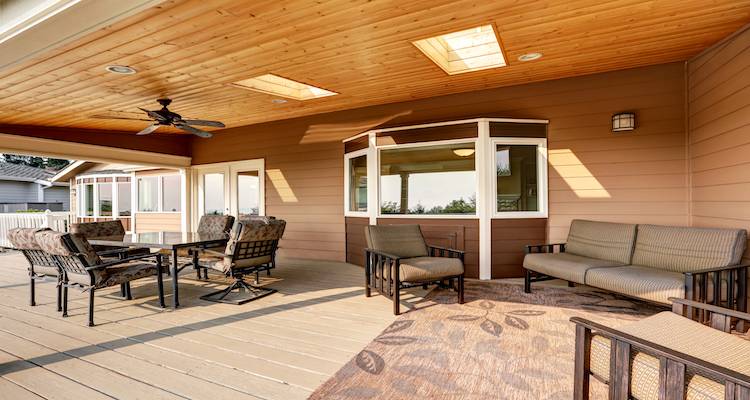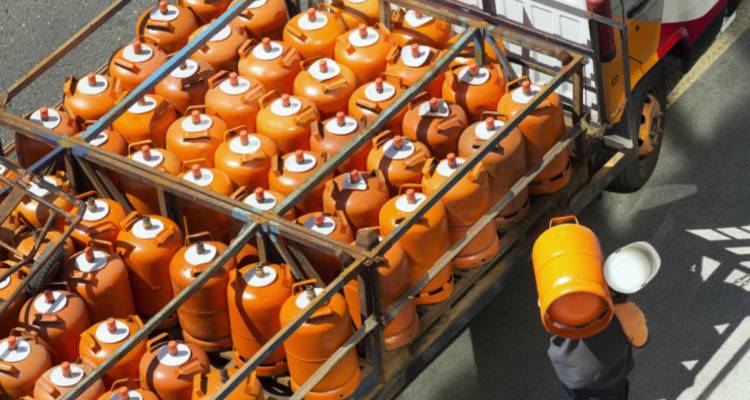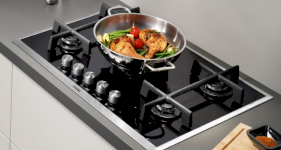CCTV Installation Cost
- The average cost of CCTV installation is £550.
- Installing security cameras usually takes less than a day.
- CCTV installation costs by camera type and number of cameras.
- CCTV installation cost calculator.
- Typical CCTV installation times and what's involved.
- How to find and hire a local CCTV installer.

£550
Table of Contents
- How Much is CCTV Installation?
- CCTV Camera Prices (Supply Only)
- Cost of CCTV Installation (Labour Only)
- Factors That Impact CCTV Installation Costs
- What's Involved in Installing CCTV?
- Choosing CCTV Cameras
- Choosing a Recording System Type
- Building Regulations & Planning Permission for CCTV
- Benefits of CCTV Installation
- Do I Need to Install CCTV?
- CCTV Removal Cost
- Checklist: Hiring a CCTV Installer in the UK
- FAQs
How Much is CCTV Installation?
In 2026, the average CCTV installation cost is around £550. However, CCTV installation prices you're quoted by tradespeople will depend on the number of cameras and type of system that you want.
The cost of CCTV installation for a single security camera starts at around £120. However, most UK homeowners install between 2 and 4 security cameras so that they have good coverage all around their home. For this type of setup, you should expect CCTV installation costs to be between £350 and £750.
Keep in mind: home security costs will be higher than this if you require something more comprehensive (e.g., alarm integration, advanced features, or monitoring).
If you have CCTV installed and take measures to improve home security, to what extent does this impact on insurance?
CCTV Installation Prices
Your CCTV installation price will depend on the type of camera you choose and how large the system you choose is.
CCTV System Prices by Size
This is the cost for the most popular standard home CCTV multi-camera systems using dome, bullet, wireless, or PTZ cameras. Specialist options, such as C-Mount, thermal, or advanced commercial cameras, are not included in these ranges and require a higher investment.
| Number of Cameras | Cost for DVR system | Cost for NVR system |
|---|---|---|
| 2 | £350 - £550 | £400 - £650 |
| 4 | £600 – £900 | £950 - £1,400 |
| 6+ | £900 - £1,400 | £1,300 - £2,000 |
CCTV Camera Prices by Type
These are the total costs for a single camera for each type.
| Type of Camera | Cost for DVR system | Cost for NVR system |
|---|---|---|
| Dome | £120 - £190 | £110 - £280 |
| Bullet | £110 - £240 | £120 - £330 |
| C-Mount | £1,050 - £2,100 | £1,050 - £2,600 |
| PTZ | £190 - £440 | £180 - £1,050 |
| Day/Night | £160 – £440 | £150 – £430 |
| Infrared/Night Vision/Thermal | £130 - £440 | £120 - £430 |
| Motion Activated | £130 - £240 | £120 - £230 |
| 24 Hour | £120 - £440 | £110 - £1,050 |
| Battery Powered | n/a | £120 - £230 |
| Wireless | n/a | £120 - £330 |
| 4G LTE | n/a | £230 – £280 |
CCTV Installation Cost Calculator
CCTV Camera Prices (Supply Only)
CCTV System Prices by Size (Supply Only)
These prices are for equipment only and don't include CCTV installation costs. They cover the most popular standard home CCTV multi-camera systems using dome, bullet, wireless, or PTZ cameras. Specialist options are not included in these ranges.
| Number of Cameras | Cost for DVR system | Cost for NVR system |
|---|---|---|
| 2 | £150 - £300 | £200 - £350 |
| 4 | £200 – £400 | £800 - £900 |
| 6+ | £500 - £900 | £500 - £1,000 |
CCTV Camera Prices by Type (Supply Only)
The below table sets out the costs for different types of CCTV cameras.
| Type of Camera | Cost for DVR system | Cost for NVR system |
|---|---|---|
| Dome | £80 - £150 | £80 - £250 |
| Bullet | £70 - £200 | £90 - £300 |
| C-Mount | £1,000 - £2,000 | £1,000 - £2,500 |
| PTZ | £150 - £400 | £150 - £1,000 |
| Day/Night | £120 – £400 | £120 – £400 |
| Infrared/Night Vision/Thermal | £90 - £400 | £90 - £400 |
| Motion Activated | £90 - £200 | £90 - £200 |
| 24 Hour | £80 - £400 | £80 - £1,000 |
| Battery Powered | n/a | £90 - £200 |
| Wireless | n/a | £90 - £300 |
| 4G LTE | n/a | £200 – £250 |
Cost of CCTV Installation (Labour Only)
The time it will take to install your CCTV system will depend heavily on the system that you choose. A single-camera system can be installed in under an hour. A multi-camera system will take anywhere from a few hours to a full day.
The CCTV installation costs will reflect the complexity of the system you are installing. Installing a single camera can cost as little as £30. Installing a fully wired multi-camera system will cost £200 - £800.
Factors That Impact CCTV Installation Costs
Several factors will affect your final CCTV installation cost. Understanding these factors helps you budget properly for your security needs.
Number of Cameras
The number of cameras you have will be the biggest factor affecting your CCTV installation prices:
- Single camera systems (£120 to £440): Simplest option that typically plugs into a standard socket, with minimal installation work.
- 2-camera systems (£350 to £650): Basic coverage for your front and back doors.
- 4-camera systems (£600 to £1,400): Comprehensive home coverage with professional cable routing.
- 6+ camera systems (£900 to £2,000): Full perimeter coverage requiring dedicated circuits and more extensive CCTV installation.

Type of Camera
Different camera technologies, including the quality of the camera, significantly impacts the cost to install CCTV:
- Basic dome/bullet cameras: £110 to £330 per camera installed.
- PTZ (pan-tilt-zoom) cameras: £180 to £1,050 for more advanced control features.
- Night vision/infrared cameras: £120 to £440 depending on the range.
- 4K resolution cameras: Add 30 to 50% to standard camera costs.
Recording System Type
The recording method you choose for your CCTV, impacts both equipment and CCTV installation costs:
- DVR systems: Lower equipment cost (£150 to £300) but more complex wiring typically adds £200 to £400 labour costs.
- NVR/IP systems: Higher equipment cost (£200 to £500) but a simpler installation that saves you around £100 to £200 in labour.
- Cloud systems: Minimal upfront cost but a £5 to £30 monthly subscription.
- Wireless systems: Save on installation (£100 to £200 less) but cameras can cost around £30 to £50 more each.
Installation Location
Where you choose to place your cameras makes a difference to the overall cost:
- Exterior cameras (£150 to £250 per camera): They're pricier because they need to be weatherproofed, require special outdoor-rated equipment, and the installer has to drill through walls and seal everything properly.
- Interior cameras (£100 to £150 per camera): More straightforward, as there's usually a power socket nearby and no need to worry about protected it from the rain.
- Mixed systems: Some homeowners end up with both, putting weatherproof cameras outside to watch doors and driveways, while using interior cameras to keep an eye on any valuables or check in on pets.
Site-Specific Factors
Different property characteristics can have an affect on labour costs and installation time:
- Standard installation (ground floor, brick walls): £30 to £50 per camera.
- Difficult access (high walls, scaffolding required): Add £150 to £300 per day.
- Long cable runs: £3 to £5 per metre for materials and labour.
- Routing through lofts/cavities: Add £100 to £300 to total cost.
- Listed buildings or stone walls: Add 20 to 30% to standard installation.
Additional Costs
Your existing electrical setup may require upgrades, affecting your overall CCTV camera installation costs:
New Outdoor Socket
An outdoor socket can be useful if you are not able to/don’t want to run a power cable into your house. The average cost to get one fitted is £130.
New Consumer Unit
If your consumer unit is older or doesn’t have enough space, then you might need to get a new one to support your CCTV system if it is more extensive. The average price to get a new consumer unit installed is £500.

What's Involved in Installing CCTV?
Installing a CCTV system in your home isn't a simple DIY job. Although a single wireless camera might be fairly straightforward, comprehensive multi-camera systems may require wiring, and any work on the consumer unit must comply with Part P.
Due to the complexity involved, most homeowners decide to hire a professional to install their CCTV.
It's recommended to get quotes from multiple installers. With MyJobQuote, you can get quotes from CCTV specialists near you that are fast, free, and with no obligation to go ahead.
Here is a run-through of a typical CCTV installation process:
Before the Job Starts
- Site Survey — The installer will assess your property by walking around, identifying vulnerable points like doors and windows, and checking for power sources and cable routes.
- System Planning — Based on your security needs, they'll recommend camera types and positions, ensuring compliance with privacy laws regarding neighbouring properties.
- Electrical Check — They'll inspect your consumer unit to determine if additional circuits or upgrades are needed.
During the Job
- Installing the Recording System — The DVR or NVR unit is mounted in a secure location (typically a loft or cupboard) and connected to power and your router.
- Running Cables — For wired systems, cables are routed through walls, lofts, or conduits. External runs require weatherproofing and all entry points must be sealed.
- Mounting Cameras — Each camera is positioned at optimal height (2.5 to 3m) using appropriate brackets. External cameras go under eaves where possible for weather protection.
- Making Connections — Cameras are connected to the recording system via cables (DVR) or network (NVR). Wireless cameras are paired with WiFi.
- System Configuration — Motion zones are set, recording schedules programmed, and remote viewing apps are configured.
After the Job
- Testing — Each camera is checked in day and night modes, motion detection is tested, and all recording functions are verified.
- Training — The installer shows you how to use the system, review footage, and access your cameras remotely.
- Documentation — You'll receive system diagrams, warranties, and if applicable, Part P compliance paperwork.
Installation by System Type
Battery Powered Cameras
Battery-powered cameras typically don't need wiring. So once the camera is mounted, setup is mostly done.

DVR Cameras
DVR cameras will need to be connected to the recording system. This will be done with coaxial video cables. It often takes some time to pin all the wires out of the way and make it look neat and tidy.
Wireless/IP/Network Cameras
For wireless cameras, you will need to connect them to your WIFI to link them to the recording system. You will then need to make sure they are properly connected to any app you might use to control and monitor them.
Installation Location Differences
Exterior Installation
Most CCTV camera systems are located outside. The most common position is pointing at your external doors. External installation involves drilling through walls for cable runs, weatherproofing all connections, and ensuring cameras are mounted high enough to prevent tampering while maintaining good viewing angles. It helps to protect the camera if you can fit it under the eaves of the house.
Interior Installation
If you need cameras inside your home, for instance, to keep an eye on pets while you're out, then you have more options. Interior cameras are simpler to install as they don't require weatherproofing and often have easier access to power sources. Cable runs are usually shorter and can be hidden more easily within the building structure.

Choosing CCTV Cameras
The type of camera mount and shape that you chose will determine what your camera can see:
Dome CCTV Camera Cost
These are a type of camera that can be deceptive. You can’t tell where they’re pointing by looking at them. The average price is £100.

Pros
- ✔ Can be a better deterrent as they are harder to avoid
Cons
- ✖ Still have a limited view of around 90 to 120o
- ✖ Most can be broken without too much effort
Bullet CCTV Camera Cost
Bullet cameras are the most common type of CCTV camera. If you think of a commercial CCTV camera on the outside of a building, that is a bullet camera. They are also known as lipstick cameras. The average cost is £150.
Pros
- ✔ Small
- ✔ Easy to Hide
Cons
- ✖ Can tell where they are looking
C-Mount CCTV Camera Cost
These cameras have changeable lenses so you can alter the view to suit your needs. They are more suited to viewing large areas. The average cost is £1,500.

Pros
- ✔ Long-range
- ✔ Easy to spot, so good as a deterrent
Cons
- ✖ More expensive
- ✖ Bulky, so harder to install
PTZ CCTV Camera Cost
These are some of the most popular cameras on the market at the moment. You can control them to decide what they see, as you need. The average CCTV camera price is £300.
Pros
- ✔ Can aim at what you want to see
- ✔ Wide field of vision
Cons
- ✖ Manual pan versions are really just static cameras you can point more easily
- ✖ More expensive
Day/Night CCTV Camera Cost
Day/night cameras can operate in both the bright and dim light. They have very sensitive light detection systems. The average cost is £250.
Pros
- ✔ Can work in place IR cameras don’t
Cons
- ✖ Don’t work in full dark
Night Vision CCTV Camera Cost
Despite there being three names, these all work the same way. They have infrared detectors which can detect people even in the full dark. The average price is £200.

Pros
- ✔ Work in full dark
- ✔ Very long range
Cons
- ✖ Pictures in the dark, won’t be suitable for identification in most cases
Motion Activated CCTV Camera Cost
These cameras only turn on when someone moves into their sensor range. The average cost is £150.
Pros
- ✔ Use small amounts of battery
- ✔ Only record when something interesting is happening
Cons
- ✖ They only record when something comes into range, so they may not catch everything important
24-Hour CCTV Camera Cost
These cameras are recording all the time. The average cost is £200.

Pros
- ✔ They catch everything. They may record people who believe they are not in range of the camera.
Cons
- ✖ They use more energy – not battery powered
- ✖ You will have a lot of footage to store and hunt through if anything happens
Battery Powered CCTV Camera Cost
Battery-powered cameras are a simple and easy option. There is no need to wire them up, so the installation is simple. If you don’t want to change the batteries, you can find ones that attach to solar panels. The average cost is £150.
Pros
- ✔ Simple set up
- ✔ Can place in more locations
- ✔ Cheap option
Cons
- ✖ Usually Motion Activated
- ✖ Need to plan to recharge/change batteries
Wireless CCTV Camera Cost
The name is a little confusing. Wireless means that they send their data without wires, usually using WiFi. They still need a mains connection or a battery. The average cost is £150.

Pros
- ✔ Easier Installation
Cons
- ✖ Potentially hackable
4G LTE CCTV Camera Cost
These cameras have their own sim card, which they use to get a signal to transmit data as needed. They are typically motion sensor cameras. The average cost is £200.
Pros
- ✔ Don’t need to be in range of your WIFI
- ✔ Portable
Cons
- ✖ Use more power than other cameras
Choosing a Recording System Type
There are two different ways that the data can be collected from your cameras.
Digital Video Recorder Cost (DVR)
These are true CCTV cameras. The whole system is wired, and the images are recorded on an independent system. The average cost is £150.

Pros
- ✔ Most secure option
Cons
- ✖ More difficult to install
Network Video Recorder Cost (NVR)
These CCTV systems share their data through your home router and use the internet for remote access. The average cost is £200.
Pros
- ✔ You can access the data from anywhere, including remote viewing
- ✔ Fewer wires are needed, so installation is easier
Cons
- ✖ The video feed can be hacked
Building Regulations & Planning Permission for CCTV
Planning permission is unlikely to apply to the installation of CCTV cameras. The main exceptions are listed buildings and some conservation areas.
Building regulations will apply to the installation of your cameras if they need to be wired into your home’s consumer unit. Most single camera systems only require a plug socket and will be exempt.
If you need to connect to the consumer unit for power, then you will need to have the job either inspected on completion, or you should check that your local tradesperson is a Part P registered electrician. This means that they can self-certify that the work is completed to the correct standard.
Benefits of CCTV Installation
There are a lot of benefits to installing CCTV in your home, some of which you may not have considered. Here are some of the benefits that people report after installing CCTV
Deter Thieves
Having visible cameras and warning signs can stop thieves from targeting your home. If there are other options, why would they target a home where there are clearly safety measures in place.
Identify Criminals
If your home is the target of a crime, then your CCTV set up may be able to help. If the criminals are caught on camera, it can make it easier to identify them. It can also speed up the whole process of an investigation and criminal case.
Evidence
CCTV is beneficial for building criminal cases. It can provide evidence for a wide range of matters, including, theft, vandalism and stalking.
Cheaper Insurance
If you have a CCTV system installed, then it may reduce your insurance premiums. If this is something that appeals to you, then it is worth having a conversation with your insurer to see if they have a preferred system that would have the most significant impact on your costs.
Feel Safer
Having a security system that includes CCTV can make you feel safer in your own home. If you are feeling unsafe for any reason, then having the cameras can make a difference. The ability to quickly check them can also be the reassurance you need to be comfortable in your home again.
Remote Monitoring
Some CCTV systems allow you to monitor your home from anywhere with an internet connection. This can be very reassuring when you are on holiday, or if you have workmen/ pet sitters in your home.
Do I Need to Install CCTV?
If you are unsure if getting CCTV installed is right for you then here are a few reasons why it might be a good idea to consider doing it.
Location
If you live in an area that has a high crime rate, then it is a good idea to consider getting a CCTV system installed. It can deter criminals from targeting your home at all. If you are the victim of a crime in your home, a home CCTV system can help you to identify the offenders and possibly retrieve your property.
Previous Crime Target
If you or your property has been the target of crime in the past, then it can be worth considering if home CCTV is a good option. Installing CCTV in a home that has previously been targeted shows that you have taken actions to prevent further issues. This alone can deter criminals from targeting your home.
Stalking Concerns
If you are concerned that you may have a stalker or are receiving unwanted attention from anyone, then CCTV is a useful tool. It can be used to provide evidence of harassment and can also alert you if your property is getting unwanted attention. It can be difficult to get the police to act on stalking concerns, and a home CCTV system can provide the needed evidence to get them to act.
CCTV Removal Cost

If you want to pay a tradesperson to remove your existing CCTV setup, you should expect to pay around £30 to £50 for a single camera.
| Number of CCTV Cameras | Removal Cost |
|---|---|
| 1 | £30-£50 |
| 2-4 | £50-£100 |
| 6+ | £100-£200 |
The job involves unscrewing the CCTV cameras from their positions and removing any connecting wires. It is unlikely to take long unless you have a large number of cameras or they are in very difficult to access locations, and you can expect it to take no more than an hour or two.
Before committing to a full removal, it is worth considering whether it's necessary, as even non-functional cctv systems can act as a visible deterrent. If you are planning to install a new home cctv system, bundling the removal with your new cctv installation makes sense. Your installer can make use of existing cable pathways and mounting points, which can save time and reduce your overall costs.
Checklist: Hiring a CCTV Installer in the UK
If you are hiring someone to install a security system in your home, then you need to be able to trust them. You don’t want just anyone to be able to access your CCTV feed. Here are some things to look out for that can give you some reassurance that you can trust your chosen tradesperson.
- Are they NSI or SSAIB accredited? Look for installers who are members of The National Security Inspectorate (NSI/NACOSS) and the Security Systems and Alarms Inspection Board (SSAIB).
- Are they on the NSI screened installer list? The NSI has a list of screened installers which is a sign that they have been checked and are certified as a safe installer.
- Do they have relevant electrical registration? If your CCTV camera installation involves mains wiring, look for a NICEIC or NAPIT registered electrician.
- Do they have positive reviews? Check the feedback they've received from other homeowners on MyJobQuote who've hired them for CCTV installation.










